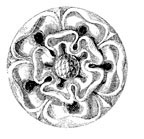
Seeking Knowledge of God through the Experience of Beauty
HARMONIOUS RELATIONSHIP IS THE NUCLEUS OF LIFE
Anyone who knows anything about the academic career of Edmund B. Miller would find it rather queer that he has now taught at all academic levels, wrote a curriculum for a liberal-arts high school, and even wrote a pastoral letter on education for an Ohio bishop. This is indeed the same lad who got an “E” in eighth-grade math, which at Florida A&M Elementary was simply the next step beyond a “D.” (His father found the grade too curious to assume it meant “Excellent.”) Edmund had, therefore, no foundation for high-school mathematics and hacked his way through the next four years, frequently appealing to the mercy of his teachers. He enjoyed biology, but only after scoring a 42 on a midterm exam did he realize that a certain amount of diligence was appropriate. After his family moved to Milwaukee, he transferred to a large, be-all-things-to-all-people high school, where students began the day in “TAC” rooms, and schedules had “mods.” Here he taxed his academic abilities with courses like Current History (in which the text was a subscription to Newsweek), World Religions (in which the class once sat around a candle and hummed a mantra), and Creative Writing (of which he remembers nothing). He sported a gold honor schedule until he was caught in the cafeteria during a period — or a mod, that is — that he was supposed to spend in study hall.
As a college freshman, Edmund once watched his classmates file into the Varsity Theatre for the Western civ lecture while he strolled the other way, under the incorrect impression that there was to be an exam that day. He enrolled in “Basketball Physics,” so called because it was a course taken by basketball players. In literature, he attempted an intellectual critique of Emerson but got his paper back with a “C” and the comment, “Nice try.” And he satisfied his math requirements by briefly enrolling in the education program and taking a course that had something to do with elementary teaching methods.
Time passed until junior year, when Edmund read Boethius and took his father’s American History class. His father taught intellectual and social history, based on the premise that the Incarnation is history’s center, and from that point man has experienced, in the delusion of progress, an acceleration of time — change for the sake of change. In class his father liked to quote Yeats about the center not holding, things falling apart. Through Boethius, Edmund was excited to learn the simple idea that to God all time exists as one moment, thereby making compatible man’s free will and God’s knowledge. In junior year, then, he began to grapple seriously with ideas, wanting to know how they jibed with his newly awakened sense of infinite God in finite history.
The fact to be remarked on here is not that the poor boy finally began to learn something. What’s remarkable is that Edmund, in his junior year, was able to accept rather readily the premise on which he based many more years of study. That premise, infinite God in finite history, must have been merely another step in a long line of premises. Maybe those early years of education were not as wasted as this brief retelling of events might suggest, or, more specifically, perhaps education had been proceeding from an unrecognized quarter. And that quarter, undoubtedly, was his own home life.
You May Also Enjoy
Fr. Hesburgh proved to be a perfect avatar for the Notre Dame he created: an endorser of some kind of vaguely conceived “natural religion.”
Catholic academics betrayed the faith with the Land O'Lakes Statement in 1967, which has spread error throughout the Church ever since.
Rob Henderson defines "luxury beliefs” as “ideas and opinions that confer status on the upper class at very little cost, while often inflicting costs on the lower classes.”

